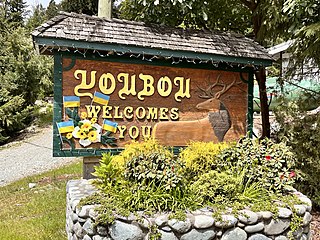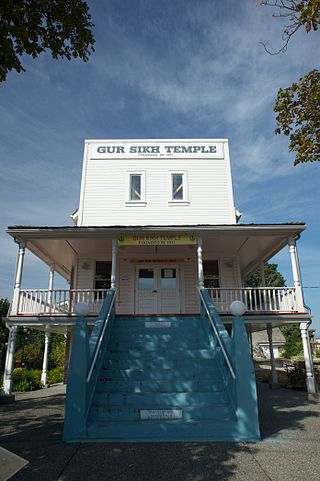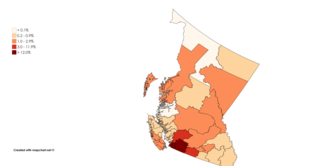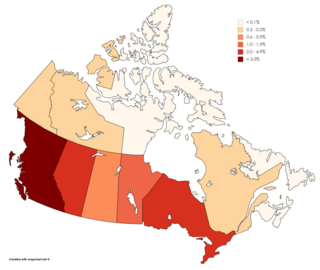
Golden is a town in southeastern British Columbia, Canada, 262 kilometres (163 mi) west of Calgary, Alberta, and 713 kilometres (443 mi) east of Vancouver.

Duncan is a city on southern Vancouver Island in British Columbia, Canada. It is the smallest city by area in Canada. It was incorporated in 1912.

North Cowichan is a district municipality established in 1873 on Vancouver Island, in British Columbia, Canada. The municipality is part of the Cowichan Valley Regional District. North Cowichan is noted for a landscape including forests, beaches, rivers, and lakes. The municipality encompasses the communities of Chemainus; Westholme; Crofton; Maple Bay; and "the South End". The latter is an informal name for a built-up area which is essentially a suburb of the City of Duncan, a separate municipality.

South Asian Canadians are Canadians who were either born in or can trace their ancestry to the Indian subcontinent, which includes the nations of India, Pakistan, Bangladesh, Nepal, Sri Lanka, Bhutan, and the Maldives.

The Komagata Maru incident involved the Japanese steamship Komagata Maru, on which a group of people from British India attempted to immigrate to Canada in April 1914, but most were denied entry and forced to return to Budge Budge, Calcutta. There, the Indian Imperial Police attempted to arrest the group leaders. A riot ensued, and they were fired upon by the police, resulting in some deaths.
Mesachie Lake is an unincorporated community in the Cowichan Valley region of Vancouver Island, British Columbia, Canada. It lies on the south shore of Cowichan Lake, British Columbia. The name is from the Chinook Jargon for "bad, evil, naughty". It was founded in 1942 by the Hillcrest Lumber Company, which built houses for its workers and their families. This company also planted many non-native fruit and shade trees which have since been given heritage status.

Wallace Taroo "Wally" Oppal, is a Canadian lawyer, former judge and provincial politician. Between 2005 and 2009, he served as British Columbia's Attorney General and Minister responsible for Multiculturalism, as well as Member of the Legislative Assembly of British Columbia for the riding of Vancouver-Fraserview as part of the BC Liberals.
Honeymoon Bay is an unincorporated community in the Canadian province of British Columbia. It is located on Cowichan Lake in the southeastern part of Vancouver Island — approximately 75 kilometres (47 mi) northwest of Victoria — at 48°49′N124°10′W. In 2011, its population was listed at 580.

Youbou is a community located on the north shore of Cowichan Lake, west of Duncan and a 15-minute (13 km) drive west of the community of Lake Cowichan, Canada. The former mill town on Vancouver Island provides a public beach and extensive recreational opportunities, including fishing, boating, and hiking.

Sikhismin Canada has nearly 800,000 adherents who account for 2.1% of Canada's population as of 2021, forming the country's fastest-growing and fourth-largest religious group. The largest Sikh populations in Canada are found in Ontario, followed by British Columbia and Alberta. As of the 2021 Census, more than half of Canada's Sikhs can be found in one of four cities: Brampton (163,260), Surrey (154,415), Calgary (49,465), and Edmonton (41,385).

Asian Canadians are Canadians who were either born in or can trace their ancestry to the continent of Asia. Canadians with Asian ancestry comprise both the largest and fastest growing group in Canada, after European Canadians, forming approximately 20.2 percent of the Canadian population as of 2021. Most Asian Canadians are concentrated in the urban areas of Southern Ontario, Southwestern British Columbia, Central Alberta, and other large Canadian cities.

The Khalsa Diwan Society Vancouver is a Sikh gurdwara organization in Vancouver, British Columbia, Canada.
Lake Cowichan is a town located on the east end of Cowichan Lake and, by highway, is 27 kilometres (17 mi) west of Duncan, British Columbia. The town of Lake Cowichan was incorporated in 1944. The Cowichan River flows through the middle of the town. Cowichan River is designated as a Heritage River.

Indo-Canadians or Indian Canadians, are Canadians who have ancestry from India. The term East Indian is sometimes used to avoid confusion with the Indigenous peoples of Canada. Categorically, Indo-Canadians comprise a subgroup of South Asian Canadians which is a further subgroup of Asian Canadians. According to Statistics Canada, Indians are one of the fastest growing communities in Canada and one of the largest non-European ethnic groups.

The Gur Sikh Temple, in Abbotsford, British Columbia, is the oldest existing Sikh gurdwara in North America and a National Historic Site of Canada. It is the only gurdwara outside of India and Pakistan that is designated as national historic site.
South Asian Canadians in Metro Vancouver are the third-largest pan-ethnic group in the region, comprising 369,295 persons or 14.2 percent of the total population as of 2021. Sizable communities exist within the city of Vancouver along with the adjoining city of Surrey, which houses one of the world's largest South Asian enclaves.

The South Asian community in British Columbia was first established in 1897. The first immigrants originated from Punjab, British India, a northern region and state in modern-day India and Pakistan. Punjabis originally settled in rural British Columbia at the turn of the twentieth century, working in the forestry and agricultural industries.

Sikhism in Greater Vancouver is one of the main religions across the region, especially among the Indo-Canadian population. The Sikh community in Vancouver is the oldest, largest and most influential across Canada, having begun in the late 19th century.

Punjabi Canadians number approximately 950,000 and account for roughly 2.6% of Canada's population, as per the 2021 Canadian census. Their heritage originates wholly or partly from the Punjab region of India and Pakistan.

Mewa Singh Lopoke was a Sikh activist in Canada who was a member of the Vancouver branch of the Ghadar Party, which called for the overthrow of British rule in India. On October 21, 1914, Mewa Singh murdered a Canadian immigration inspector, W. C. Hopkinson, a political act of violence for which he was executed by the Canadian government. In the eyes of Sikh Canadians, Mewa Singh's assassination of Hopkinson was a display of martyrdom, one which they commemorate annually.


















